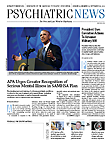The Food and Drug Administration (FDA) has approved a unique medication to treat individuals with insomnia—Belsomra (suvoraxant).
“Unlike the mechanism of prior sleep drugs that target neurotransmitters that promote sedation,” explained Karl Doghramji, M.D., medical director of the Jefferson Sleep Disorders Center at Thomas Jefferson University, “this drug acts through neurotransmitters that are involved in wakefulness.” In an interview with Psychiatric News, Dogharmaji said that Belsomra antagonizes molecular pathways of orexins—chemicals involved in keeping people awake. Because of its nontraditional mode of action for a sleep drug, Belsomra is the first of its kind to receive such approval.
The effectiveness of Belsomra was studied in three clinical trials consisting of more than 500 participants who were given various doses (5 mg, 10 mg, 15 mg, or 20 mg) of the orexin antagonist or a placebo. The results showed that the patients in the Belsomra group fell asleep faster and spent less time awake during the night when compared with individuals taking placebo.
Furthermore, the FDA asked Merck, the drug’s manufacturer, to assess next-day driving performance of individuals who are taking Belsomra. The evaluation showed that impaired driving skills were significant in patients who took the maximum approved dose of 20 mg. The most commonly reported side effect among clinical trial participants was drowsiness. Belsomra was not compared with other approved medications indicated for insomnia.
The FDA recommends that Belsomra be taken no more than once a night, within 30 minutes of going to bed, with at least seven hours remaining before the planned wake time.
“Although we don’t know, at this time, what Belsomra will offer in terms of clinical utility, specifically above other sleep medicines,” said Doghramji, “at least we have an additional option in sleep medications that may prove to be more effective in certain patients.”
Doghramji, who is a consultant to Merck but has not been involved in Belsomra research, told Psychiatric News that it would be helpful if future studies could investigate the effectiveness of Belsomra in psychiatric populations that are commonly impacted by insomnia, such as patients with major depressive disorder or posttraumatic stress disorder, and in patients who take certain antipsychotic medications.
Because Belsomra can be abused and lead to dependence, the FDA has classified it as a Schedule IV drug and will provide patients with a Medication Guide with instructions for its use and important safety information.
Ronald Farkas M.D., Ph.D., the clinical team leader in neurology in the FDA Office of New Drugs, said in an interview with Psychiatric News that the agency will “intensively monitor both efficacy and safety information reported by patients, prescribers, and others with first-hand knowledge” of the newly approved drug.
Belsomra is expected to be released in the U.S. market by the end of the year. ■
